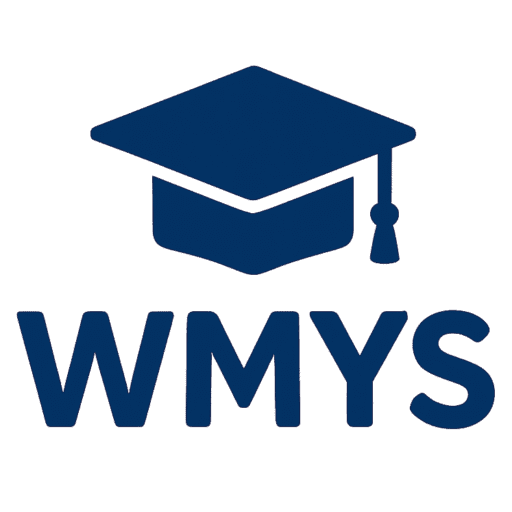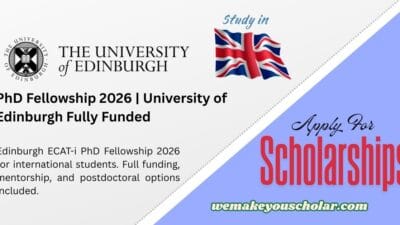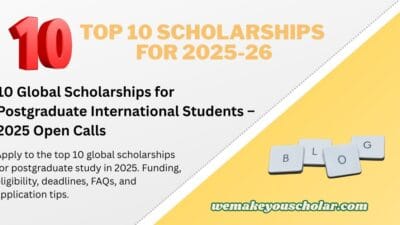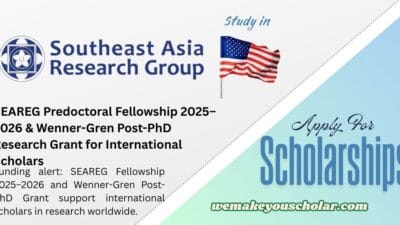USSC PhD Scholarship 2025 — The Straightforward Guide for International Students
If your research interests sit in American Studies, US foreign policy, economic security, or American politics and culture, the United States Studies Centre (USSC) PhD Scholarship 2025 at the University of Sydney is a real opportunity to consider. It’s a targeted, well-funded scholarship aimed at supporting outstanding PhD candidates both financially and professionally.
This guide is written specifically for international students. It explains eligibility, the full package of benefits, how to apply step-by-step, what makes a winning application, how the USSC scholarship compares to other Australian PhD funding (like RTP), and practical tips for managing travel, visas, and life in Sydney. No fluff — just the information you need to decide and act.
Quick snapshot — what the USSC PhD Scholarship gives you
- Stipend: AUD 41,753 per year (RTP-equivalent) — indexed annually — for up to 14 research periods (full-time), subject to satisfactory progress.
- Travel support: AUD 5,000 per year (up to AUD 15,000 total) for conferences, fieldwork or research travel.
- Research bootcamp/training: One-off payment up to AUD 10,000 to attend a research bootcamp or training program at a U.S. university (requires approval).
- Part-time flexibility: Possible in exceptional circumstances (medical, carer responsibilities), though terms differ and tax implications may apply.
- Leave entitlements: Paid recreation and sick leave, additional special leave options (see terms).
These extras make the USSC scholarship more than “just a stipend.” They actively support international exposure and networking — crucial for building a strong academic profile in American Studies.
Who can apply? — clear eligibility for international students
Before you invest time in an application, check the essentials:
- You must have an unconditional offer of admission to, or already be enrolled in, a PhD program in the Faculty of Arts and Social Sciences at the University of Sydney. If you’re selected before your unconditional offer is issued, the scholarship cannot be formally awarded until that offer is in place.
- You must hold, at minimum, one of the following:
- An Honours degree (First Class) or equivalent; OR
- A Master’s degree with a substantial research component.
- Your proposed PhD research must clearly align with the USSC’s mission and expertise: American Studies, American foreign policy, economic security, or U.S. politics/culture.
If your degrees are overseas, the University will assess equivalence. International applicants who meet these standards are encouraged to apply.
Important dates — plan these into your calendar
- Applications open: 15 September 2025
- Applications close: 10 October 2025
- Estimated scholarship start: aligned with your PhD enrolment and subject to admission/unconditional offer
These dates are strict. Apply early and confirm your admission status with the Faculty & prospective supervisor as soon as you can.
What the scholarship pays — explained in student terms
1. The annual stipend
The core benefit is a living stipend equivalent to the University of Sydney’s Research Training Program (RTP) rate — AUD 41,753 per annum (2025 rate). That’s intended to support your day-to-day living (rent, food, transport, study materials). It’s paid subject to satisfactory academic progress.
2. Travel support
USSC provides AUD 5,000 per year for travel, up to AUD 15,000 total. This is meant to fund fieldwork, conference attendance, or international collaborations. To access these funds you’ll usually need to submit documentation (receipts, travel plans) and coordinate with your supervisor and the centre’s finance team (they typically manage payments through the university’s Concur system).
3. Research bootcamp / training allowance
USSC will fund up to AUD 10,000 one-off for participation in a research bootcamp or training program at a U.S. university, with approval. This lets you gain targeted skills or networks (e.g., data archives access, specialized workshops) that are directly relevant to your PhD.
4. Leave and support entitlements
Scholarship holders receive leave entitlements (annual recreation leave, sick leave, parental leave under qualifying conditions), and may apply for additional paid leave in medically substantiated situations. The policy is generous compared to many scholarships, but keep in mind that leave does impact the timeframe of your funding.
Duration, suspensions, and termination — what to expect
- Funding is available for up to 14 research periods (full-time). If you have undertaken prior research time that counts toward candidature, that may reduce the available periods.
- The scholarship cannot be deferred to a different calendar year; it must be taken in the year awarded unless Centre allows within the same academic year.
- Suspensions are possible (e.g., parental leave, medical), but approval is required and can affect tenure.
- The Centre may terminate funding if academic progress is unsatisfactory, the student engages in misconduct, or the student withdraws/resigns.
Selection criteria — how winners are chosen
The selection panel typically includes the USSC CEO, Academic Director, and supervisors. They assess applications on:
- Academic merit: grades, honours classification, and the strength of prior research.
- Research proposal: clarity, originality, feasibility, and alignment with USSC strengths.
- CV and experience: publications, internships, relevant employment, or policy experience.
- References: strong academic references that can attest to research ability and independence.
In short, you must show you are both capable (strong track record) and have a project that fits the centre’s mission.
How to write a research proposal that stands out
A clear, focused proposal is your single best tool. For USSC, show both intellectual curiosity and policy or scholarly relevance to American Studies. Use this structure:
- Title: brief and descriptive.
- Context: Why the question matters (to scholarship, policy, or public debate).
- Research question(s): one central question plus 1–2 sub-questions.
- Methodology: sources, archives, datasets, fieldwork plans, or theoretical approach.
- Feasibility: timeline, access to data, and how the bootcamp/travel funds will add value.
- Expected outcomes: publications, policy briefs, conferences, or public engagement.
Keep it readable for non-specialists on the panel: explain technical terms and show the bigger picture.
Practical considerations for international students (visa, cost, living in Sydney)
Visa basics
If you are awarded the scholarship and will study in Australia, you’ll need the appropriate student visa (Subclass 500) or other visa as advised by the University. The scholarship does not replace visa requirements — apply for your visa early and prepare financial documentation where required, even if you will receive stipend payments.
Cost of living
Sydney is relatively expensive. The stipend (AUD ~41.7k) is intended to cover living costs, but how comfortable you are depends on your lifestyle and housing choices. Typical monthly costs include rent (varies widely), groceries, transport (student concessions are available), and utilities. Plan a budget and check university accommodation vs private options.
Health insurance
International students generally need Overseas Student Health Cover (OSHC) for visa purposes. Check whether your scholarship or the University provides any additional support for health insurance; otherwise, arrange OSHC early.
Comparing USSC with RTP and Other Australian Opportunities
What is RTP?
The Research Training Program (RTP) is a national Australian funding mechanism that underpins university scholarships (stipends and fee offsets) across Australia. Universities allocate RTP places to eligible HDR students (both domestic and international) based on merit.
How USSC aligns with RTP
- USSC stipend is aligned to RTP rates (hence the AUD 41,753 figure), which means the core living support is on par with a standard RTP scholarship.
- Unlike a generic RTP award, USSC also provides targeted travel and training funds (AUD 5k/year + up to AUD 10k bootcamp) — making it particularly attractive for international research that benefits from U.S. exposure.
When to prefer USSC over a generic RTP place
- Your research topic aligns closely with USSC mission (American Studies, US foreign policy, etc.).
- You want funded international experiences (bootcamps, US collaborations).
- You value being embedded in a centre with focused networks and public-facing events relevant to U.S. studies.
Other Australian scholarships to consider (brief)
- University RTP scholarships: Broader discipline coverage, sometimes with additional top-ups by faculties.
- Australia Awards: Country-specific government scholarships for some nations (often require separate applications).
- Research centre scholarships: Many centres and institutes provide targeted scholarships similar to USSC for specific fields.
Tip: If you are eligible for USSC, apply — it’s specialized and includes unique travel/training supports that many RTP-only awards don’t offer.
If you’re awarded the scholarship — next steps and practicalities
- Accept the scholarship and confirm enrolment logistics with the Faculty and your supervisor.
- Complete any onboarding, including HR or finance forms for stipend payments and accounts.
- Organise your visa (if required) and OSHC (health insurance).
- Plan your initial budget — first months often include deposit payments for housing and relocation costs.
- Discuss travel and bootcamp plans early with your supervisor and the USSC Academic Director to secure approval and timing.
Practical example: How a student used USSC funding
Imagine Maria, a PhD candidate from Brazil studying U.S. immigration policy. With the USSC scholarship she:
- Used the annual travel funds to visit U.S. archives and present at two conferences (funds covered flights and local costs).
- Attended a week-long bootcamp at a U.S. university teaching advanced migration data analysis (the $10k allowance covered fees and short-term living costs).
- Published two articles and a policy brief during her first three years, boosting her academic profile and employability.
This is exactly the kind of practical impact USSC funding is designed to support.
FAQ — quick answers for international applicants
Q1: Do I need an unconditional offer to apply?
No — you may apply without it, but a scholarship cannot be formally awarded until you hold an unconditional offer of admission. If selected conditionally, the Centre will await proof of admission before issuing the official award.
Q2: Are international students taxed on the stipend?
Australian tax rules can apply. Stipends are usually exempt from income tax if they are not payment for services, but rules vary. Get advice from the university payroll office or a tax advisor in your country. If you are offered a part-time scholarship, there may be tax implications — seek registered tax advice.
Q3: Can I work while holding this scholarship?
Work should not interfere with full-time PhD study. Visa conditions restrict working hours for international students. Discuss any paid work with your supervisor and review visa rules before accepting employment.
Q4: Can the scholarship be extended beyond 14 research periods?
No, the scholarship covers a maximum of 14 research periods for full-time candidates. Any extension or additional funding must be negotiated separately and is not guaranteed.
Q5: What happens if I need to suspend my studies?
Suspension within the first six months is generally not permitted. After that, students may apply for suspension for justified reasons (medical, parental, other), but periods of suspension may affect funding duration and must be approved by the Centre.
Where else to look — complementary Australian opportunities
QUT PhD Scholarships for International Students 2026 | $40,000 Stipend
Fully Funded ANU Postdoctoral Fellowship 2025 – Research in Australia
UniSQ 2026 International Scholarships in Australia | Fully Funded Study Opportunities
Use these as backup or complementary funding sources — many students combine modest top-ups with a primary scholarship.
Official link & final words
If your research is about American Studies or U.S. policy and you want real international exposure, the USSC PhD Scholarship is worth a strong application. It combines a competitive stipend with travel and training funds that can accelerate your research and career.
Apply here and read official terms: USSC PhD Scholarship — University of Sydney
Internal link placeholders for your site: See also: [Apply for RTP Scholarships in Australia] • [Student Visa Guide for Australia] • [Top Conferences for American Studies].




